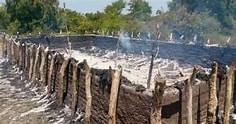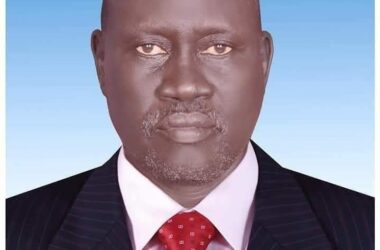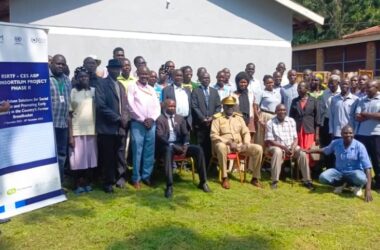Deputy Minister of Justice Joseph Malek Arop discusses political status and legislative readiness for 2024 elections.
By William Madouk
South Sudan prepares for its first general elections in December 2024, but the landscape seems under challenges; as some political parties are already on track, others appear unprepared.
To better understand the situation, No. 1 Citizen Daily Newspaper reporter William Madouk takes us through, an in-depth, one-on-one interview with Hon. Joseph Malek Arop, Deputy Minister of Justice and Constitutional Affairs, who is also an interim chairman of United Sudan African Party (USAP), molded by late politician Joseph Okello.
Mr. Arop, who, in youthful life, is at the peak of his political career, discussed South Sudan’s status and its legislative readiness for the 2024 elections.
Madouk: Kindly introduce yourself to our readers.
Arop: I’m Joseph Malek Arop. I’m the chairperson of the United Sudan African Party (USAP), Member of Parliament and deputy minister of justice and constitutional affairs. Thank you, No. 1, Citizen for this visit to my office.
Madouk: What is your party’s relationship with the ruling Sudan People’s Liberation Movement (SPLM) party?
Arop: We are not an opposition party; I’m a national agenda ally with SPLM. SPLM is our main ally, and I also want to assure the people of South Sudan that USAP has not been an opposition one day. We are working closely with SPLM. But we are party to ideology, and we also have regulations and a constitution.
Madouk: The clock is ticking towards the end of the transition period; do you think the election will be conducted? And as the USAP party, whom are you supporting as the flag bearer?
Arop: Yes, the USAP national agenda is supporting the election to be conducted at the end of this transition period, and we are supporting President Salva Kiir to be the next president.
In our decision as USAP, we will support President Kiir if he runs for president. But we will contest in different areas. USAP will contest for governorship and commissionership, and every corner of South Sudan will be ready to have members who are contesting.
Madouk: But do you think there is a conducive environment for a free and fair election?
Arop: The situation, I also want to clarify is that the election is good, yes, but are we going for the election to bring peace or to create more chaos in South Sudan? If the environment is not conducive, it’s better to be adjoined, because we need security forces to be deployed and also some laws related to the peace agreement to be done.
Otherwise, if we are not ready for that, we need all political parties to sit down and agree. Are we going for an election or not? Although, yes, it’s conditional in the roadmap.
If there is no conducive environment, we should also sit as parties to an agreement and decide. But what we need is for a real election to be conducted. We spent many years in the transitional period, and we want to give service to our people in South Sudan.
We need a small, not large government to be able to provide services, and we need an elected government that can provide service to the people of South Sudan. The elected government can now implement what has not been implemented by the transitional government of national unity.
I will also tell other political parties to come to an agreement; we need to work in harmony, and if there are any disputes, we need to address them in a good manner. We are responsible for the implementation of the peace agreement.
William: Why was the president given authority to appoint 5% of MPs in the recently disputed Election Act?
Arop: I made the motion that the elected president should be given the prerogative to appoint 5%; this drew attention between the IO and ITGoNU, but what we mean is that we need parliament to be inclusive.
5% of the prerogative of the president is to nominate the head of civil service; trade unions should be appointed; pastoralists, farmers, and also workers unions should be represented in parliament. It should also include military or organized forces in parliament because those people need representation in parliament.
They are not politicians, but the prerogative of the president can also give them proportion to appoint these people and also those who are minorities. Even minorities cannot participate in elections; the president should be given the mandate or power to appoint those people.
5% is not meant for politicians to be appointed or those who failed in the election; we need these people to be given; those heroes and wounded people should also be considered in that 5%, and other professions in South Sudan should be given a chance to participate in parliament, this can help us in legislation, and can also make a good reform in parliament and participate effectively.
Parliament is not only for politicians but also for civil society and others who have the right to be part of that institution.
Madouk: How ready is South Sudan for the election in terms of legislation?
Arop: In terms of legislation, all legislations are in place, and we are working hard to ensure all legislations are completed in time.
Madouk: Political, civic space and freedom of expression are described as shrunken; what is your take?
Arop: The freedom of expression is there, but some people have doubts. I went to Upper Nile because I am the head of the USAP party. I did rally there and carried out one of the huge conventions.
I have been given a chance, even though I took SSBC. Just last week, I was in Yambio, where we held a rally and opened an office. You know there is freedom, but some people fear for nothing.
However, there are some challenges also for those who don’t have registered political parties, because a registered political party now in South Sudan has the freedom to work everywhere because they have a license.
There are some groups and movements that did not form political parties; the agreement brought them to be part of the government, but they don’t have the right to rally because they are not licensed for that.
I think there are some rooms because you cannot talk about a fair and credible election if you don’t give freedom to those people to make campaigns, to make registrations for their parties, and to give them room to disseminate peace through political parties.
Madouk: But recently, South Sudan Opposition Alliance (SSOA’s) event was called off by a security agent, so where is civic space?
Arop: Yes, you know, the issue of Dr. Lam Akol. I don’t know if they make all legal documents because here freedom is not just something you can do without approval from concerned authorities.
If you are in Juba, you are supposed to go to the mayor, seek permission, and report to the police to protect that rally, because maybe the fighting can happen.
Thus, the concerned authority, if you do not meet all these criteria, cannot give you a chance to make that rally because we have been making rallies in Juba here several times, but you need to have all the legal papers, and after that, you can be given a chance.
Also, if you want to make a rally for the purpose of dissemination, that’s good; you can be allowed, but if you have another intention, if you want to mobilize other politicians to join your party by distributing T-shirt blabs, that’s not allowed, but you are allowed on your premises as a party.
Now, in my premises as a party, I can make a rally, but in an open place, you cannot make a rally because sometimes you are going to turn it into a demonstration that can affect people.
We need political parties that are registered to prepare all the papers that are required to hold a rally.
Madouk: Why is USAP not contesting for the presidency?
Arop: We decide USAP is going to contest for other positions, but it’s not the presidency, because we are allies, and up to now our alliance is active, and we are also abiding by what has been agreed upon by allies.
It’s not USAP alone, but the national agenda group is going to stand behind President Kiir. If Kiir contests to be president, we will support him because we want to give him a chance.
The president made a compromise to bring five vice presidents, and he also accepted peace in South Sudan. Kiir should be rewarded because he made a compromise to bring peace to the people of South Sudan.
But in governmental and other positions, we will contest; if all else is said and we agree, we are united as president, and President Kiir is a uniting factor.
But other positions we are ready to contest, yes, if the funds are available because now, we have a new national election act. We already agreed that all political parties were going to be supported. If we have the ability and also get support from the government, we will contest because we need a democratic parliament that can make reforms and that can hear the grievances of our people.
It cannot be left to one party; we will compete, but for the presidency, my party supports General Salva Kiir to be elected president, without doubt, and also on behalf of our group, the National Agenda Group, headed by Dr. Martin Elia, that is our position.
Madouk: Legislation is there, as you mention, but delay in the deployment of forces is another issue, and the political party council is not yet established!
Arop: I agree with you. I came from the meeting now; we sat to reconstitute the political party council, and we also got the nominees from civil society. Because those people are non-partisan, we brought them, and we will take them to parliament in the next sitting, to vet, and also to reconstitute the political party council. From there, all political parties and those who need to be political parties will go down to register.
Security arrangements are a very important factor. Without security arrangements, we cannot go for elections because we are going for elections to bring peace. If security is not there, who is going to campaign in areas of insecurity?
But those challenges and demands for the conduct of free and fair elections can be addressed within the remaining period of the roadmap. The issue of elections is our concern as people of South Sudan to bring an end to people’s sufferings.
Since the formation of the transitional unity government, no services have been delivered to the people because people are using the money to build their parties rather than delivering the services to South Sudanese citizens.
Madouk: Your message to political parties?
Arop: We should commit ourselves, all political parties, to sign a document stating that if an election is conducted, we should accept the results or outcomes of the polls. And all of us agreed to sign it.
If you fail to be elected as a leader during the election, please! You have to accept and give a chance to the elected leaders.
Madouk: Do you think that with the remaining period, parties can implement pending provisions?
Arop: Yes, I am totally sure the parties will implement the pending provisions because almost all the legislation is in place. The list of second command echelons is in the pipeline, and maybe next week we can deploy the second command and start the graduation of forces within 2 months.
Also, in an election, what we need is a police force. People should know that the police force is needed more than the army; the army is just for border security, but a well-trained police force can protect people. But also, if we reach that time and some issues are still pending, it is better if we still go for elections.
We can use the estimated population census for elections, but the rest can be completed by an elected government, such as the permanent constitution.
Madouk: How do you see the Election Act being passed by parliament? Will it affect polls?
Arop: Election Act was passed by a simple majority, and all of us agreed.
Madouk: What about the Abyei administrative area?
Arop: We raise a point. Abyei special administrative area is still under dispute between Sudan and South Sudan, and the final status has yet to be determined, so we decided that Abyei should be exempted from the elections.
All conventions and international law do not allow us to consider disputed areas as part of us and give them legitimacy.
Madouk: The office life of the president is not mentioned in the Election Act; don’t you think this will give a lifetime president if one comes to power?
Arop: No, elections are every five years.
Madouk: But why was it not mentioned in the Election Act?
Arop: As a general principle, it’s in the transitional constitution of South Sudan, which was amended, so the constitution gives a president life in office for 5 years.
That means every five years, the people of South Sudan should go to the polls, so it’s a limit; it cannot be a lifetime president.
Madouk: Your final message
Arop: South Sudan should accept that the elected president should be given a prerogative to appoint minority people in South Sudan, including civil society, pastoralists, farmers, and also trade and workers unions.
We need an inclusive parliament where every person and armed force should be represented.
My message to all people in South Sudan is: Let us work for peace and also let us be responsible people so that we can build our nation. Without an elected democratic system in the country, we cannot build our nation.
To the armed forces and security organs, I want to tell them that they are non-partisan; they are not political parties; they should give rights to everyone. You’re our army and our police, which protects us all.
Don’t take sides and don’t defend anyone; you are supposed to act on behalf of the national army that can protect the people of South Sudan.
Lastly, I want to urge opposition parties such as the IO, SSOA, and others to accept the results of the upcoming elections. We should decide and agree that the election is our concern, and we should go for it.
Let us give a chance to our people to elect their leaders and to participate in August House, because parliament is not only meant for politicians but also for us as South Sudanese, including persons with disabilities and traders, just to mention a few.
.




